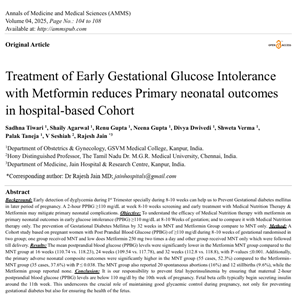Treatment of Early Gestational Glucose Intolerance with Metformin reduces Primary neonatal outcomes in hospital-based Cohort
Authors
##plugins.themes.bootstrap3.article.main##
Abstract
Background: Early detection of dyglycemia during Ist Trimester specially during 8-10 weeks can help us to Prevent Gestational diabetes mellitus in later period of pregnancy. A 2-hour PPBG ≥110 mg/dL at week 8-10 weeks screening and early treatment with Medical Nutrition Therapy & Metformin may mitigate primary neonatal complications. Objective: To understand the efficacy of Medical Nutrition therapy with metformin on primary neonatal outcomes in early glucose intolerance (PPBG) ≥110 mg/dL at 8-10 Weeks of gestation; and to compare it with Medical Nutrition therapy only. The prevention of Gestational Diabetes Mellitus by 32 weeks in MNT and Metformin Group compare to MNT only. Method: A Cohort study based on pregnant women with Post Prandial Blood Glucose (PPBG) of ≥110 mg/dl during 8-10 weeks of gestational randomised in two group; one group received MNT and low does Metformin 250 mg two times a day and other group received MNT only which were followed till delivery. Results: The mean postprandial blood glucose (PPBG) levels were significantly lower in the Metformin MNT group compared to the MNT group at 16 weeks (110.74 vs. 118.23), 24 weeks (109.54 vs. 117.78), and 32 weeks (112.8 vs. 118.8), with P-values ≤0.001. Additionally, the primary adverse neonatal composite outcomes were significantly higher in the MNT group (55 cases, 52.3%) compared to the Metformin-MNT group (35 cases, 37.6%) with P ≤ 0.038. The MNT group also reported 20 spontaneous abortions (16%) and 12 stillbirths (9.6%), while the Metformin group reported none. Conclusion: It is our responsibility to prevent fetal hyperinsulinemia by ensuring that maternal 2-hour postprandial blood glucose (PPBG) levels are below 110 mg/dl by the 10th week of pregnancy. Fetal beta cells typically begin secreting insulin around the 11th week. This underscores the crucial role of maintaining good glycaemic control during pregnancy, not only for preventing gestational diabetes but also for ensuring the health of the fetus.
##plugins.themes.bootstrap3.article.details##
Copyright (c) 2025 Sadhna Tiwari, Shaily Agarwal, Renu Gupta, Neena Gupta, Divya Dwivedi, Shweta Verma, Palak Taneja, V Seshiah, Rajesh Jain

This work is licensed under a Creative Commons Attribution 4.0 International License.
Creative Commons License All articles published in Annals of Medicine and Medical Sciences are licensed under a Creative Commons Attribution 4.0 International License.
[1] International Diabetes Federation. IDF Diabetes Atlas, 10th edn. Brussels, Belgium: 2021. Available at: https://www.diabetesatlas.org.
[2] Hernandez TL, Friedman JE, Van Pelt RE, Barbour LA: Patterns of glycemia in normal pregnancy: should the current therapeutic targets be challenged? Diabetes Care. 2011, 34:1660-8. 10.2337/dc11-0241.
[3] American Diabetes Association. (2020). 2. Classification and Diagnosis of Diabetes: Standards of Medical Care in Diabetes-2020. Diabetes Care, 43(Supplement 1), S14–S31. https://doi.org/10.2337/dc20-S002
[4] Hinkle SN, Tsai MY, Rawal S, Albert PS, Zhang C. HbA1c Measured in the First Trimester of Pregnancy and the Association with Gestational Diabetes. Sci Rep. 2018 Aug 16;8(1):12249. doi: 10.1038/s41598-018-30833-8
[5] Saxena P, Yadav A, Singh M, et al. Correlation Between the First Trimester Two-Hour Postprandial Blood Glucose Greater Than 110 mg/dL for the Prediction of Gestational Diabetes Mellitus. 2024; Cureus 16(8): e66652. doi:10.7759/cureus.66652
[6] Brand KMG, Saarelainen L, Sonajalg J, Boutmy E, Foch C, Vääräsmäki M, Morin-Papunen L, Schlachter J; CLUE Study Group; Hakkarainen KM, Korhonen P. Metformin in pregnancy and risk of adverse long-term outcomes: a register-based cohort study. BMJ Open Diabetes Res Care. 2022 Jan;10(1): e002363. doi: 10.1136/bmjdrc-2021-002363.
[7] Linh Nguyen, Shiao-Yng Chan, Adrian Kee Keong Teo: Metformin from mother to unborn child - Are there unwarranted effects? EBioMedicine. 2018, 35:394-404. 10.1016/j.ebiom.2018.08.047.
[8] Sciacca, L.; Bianchi, C.; Burlina, S.; Formoso, G.; Manicardi, E.; Sculli, M.A.; Resi, V. Position paper of the Italian Association of Medical Diabetologists (AMD), Italian Society of Diabetology (SID), and the Italian Study Group of Diabetes in pregnancy: Metformin uses in pregnancy. Acta Diabetol. 2023, 60, 1421–1437. doi: 10.1007/s00592-023-02137-5
[9] National Institute for Health and Care Excellence. Diabetes in pregnancy: Management from preconception to the postnatal period. [accessed on March 10, 2023]. Available from: https://www.nice.org.uk/guidance/ng3/resources/diabetes-in-pregnancy-management-of-diabetes-and-its-complications-from-preconception-to-the-postnatal-period-51038446021
[10] Dornhorst A, Rossi M. Risk and prevention of type 2 diabetes in women with gestational diabetes. Diabetes Care 1998; 21 Suppl 2: B43-B49 [PMID: 9704226]
[11] Simmons D, Immanuel J, Hague WM, Teede H, et al; TOBOGM Research Group. Treatment of Gestational Diabetes Mellitus Diagnosed Early in Pregnancy. N Engl J Med. 2023 Jun 8;388(23):2132-2144. doi: 10.1056/NEJMoa2214956

